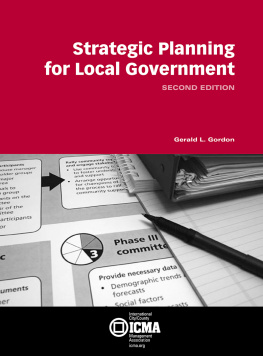National Strategic Planning and Practice
It is my judgement that no country, including my own, has yet achieved a fully effective scientific and technical information system. We are all on the road to developmentModern information systems require high level planning ... It does not help a country to be part of the international apparatus, able to draw from the world s knowledge bank rapidly ; unless it has a growing infrastructure able to use and exploit knowledge
(McElroy, 1971. In: Aines and Day, 1975: 10)
First published 200 I by Ashgate Publishing
Reissued 2018 by Routledge
2 Park Square, Milton Park, Abingdon, Oxon OX14 4RN
711 Third Avenue, New York, NY 10017, USA
Routledge is an imprint of the Taylor & Francis Group, an informa business
Copyright Liaquat Hossain 2001
All rights reserved. No part of this book may be reprinted or reproduced or utilised in any form or by any electronic, mechanical, or other means, now known or hereafter invented, including photocopying and recording, or in any information storage or retrieval system, without permission in writing from the publishers.
Notice:
Product or corporate names may be trademarks or registered trademarks, and are used only for identification and explanation without intent to infringe.
Publishers Note
The publisher has gone to great lengths to ensure the quality of this reprint but points out that some imperfections in the original copies may be apparent.
Disclaimer
The publisher has made every effort to trace copyright holders and welcomes correspondence from those they have been unable to contact.
A Library of Congress record exists under LC control number: 99072604
ISBN 13: 978-1-138-63566-1 (hbk)
ISBN 13: 978-1-315-20419-2 (ebk)
This book explores the relationships between a Telecommunications Strategic Planning Process (TSPP), the organisation and the environment for developing an understanding of the idea of a National Telecommunications Strategic Planning Process (NTSPP) in Thailand. The overall aim is to explore a new understanding of a NTSPP by providing the first detailed study of the strategic planning and practices of the Thai telecommunications regulators during its first 42 years (1954-1996). It applies the Strategic Planning Process (SPP) principles to further the understanding of a NTSPP in Thailand. By using the SPP framework, this study develops a theoretical TSPP framework for analysing the underlying TSPP strategics within the national telecommunications regulators in Thailand. It also seeks to illustrate the limitations of the traditional strategic planning theory when applied to a NTSPP. The central thesis posited, is that to develop an understanding of the underlying TSPP strategics that has occurred within the national telecommunications regulators that have appeared to play a significant role in Thailands NTSPP.
It is crucial to have a deep understanding about the relationships between a TSPP, the organisations, and the environment. It is argued that for a telecommunications strategic plan to be successful, at the organisational level and the national level, the understanding of these relationships is vital. One tacit assumption underlying the work reported here is that unless an appropriate TSPP can be inaugurated at the organisational level, a NTSPP can not succeed. At a more abstract level, the work reported here adopts a multiple theoretical approach (normative-descriptive), and also endeavours to consider whether the normative-descriptive dichotomy of the strategic planning theories are, in fact, a reasonable and useful paradigm for developing an understanding of a NTSPP from both theoretical and applied perspectives. Thus, the multidisciplinary process approach adopted is not intended to lead to a complete alternative theory, nor is it intended to be merely a synthesis. This book provides the first detailed insights for developing an understanding of a NTSPP in Thailand. From a theoretical perspective, this book illustrates that lack of formalisation and concensus in Thailands NTSPP is the fundamental backlog for the successful operation of its industry. It is also true that formal interaction among the Thai telecommunications regulators are lacking and this leads to lack of cooperation and coordination among them. This lack of cooperation and formal interaction among the telecommunications regulators are eventually impeding the growth of the national telecommunications development in Thailand. For the practitioner, these findings also illustrate a new set of possibilities for the development of a theoretically based TSPP, thus placing the organisational TSPP in a position to significantly and positively influence the future of a NTSPP in Thailand.
In stating this, it is essential to address the following questions for the purpose of providing an in-depth analysis of the national strategic planning and practice for the case of Thai telecommunications regulators: Why has the Thai telecommunications industrys development lagged far behind from meeting the global competitiveness? Why have the SOEs failed to meet the growing subscribers demand as well as achieve network economics of scale? How do roles and relationships of the national telecommunications regulators impede the success of the telecommunications development in Thailand? How are the environmental factors influencing Thailands national telecommunications network development planning processes? How appropriate are the practised Thai strategic planning processes for accommodating future global telecommunications network technologies and services? And how can the need for a more formal strategic planning process for the telecommunications strategic planning functions of the major regulators be better satisfied and integrated to support a NTSPP in Thailand?
Firstly, I would like to express my appreciation to Professor Joan Cooper and Dr Robyn A. Lindley for their time and patience during my study at the School of Information Technology and Computer Science. Dr Lindley has not only acted as a supervisor but also as a mentor and friend throughout my period at the University of Wollongong. This research work would not have been completed without her assistance. I also would like to thank Dr Richard Joseph, Tony Dean, David Bomba, Dr Carole Alcock, and Dr Leon Dunn. Thanks to Tareque Nasser and Farid Uddin Ahmed for their time and efforts during my PhD research.
I would also like to thank the Rev. Bro. Dr Prathip Martin Komolmas, Vice Chancellor of Assumption University of Thailand for providing financial support throughout my candidacy at the University of Wollongong. There is also no way of expressing adequately the helpfulness of the academics and students from other universities. Thanks to the senior executives of the participating organisations: the TOT, the CAT, the PTD, the MOTC, the MOST, the TDRI, the TT&T and others for providing useful comments and assistance.
Lastly, I would like to thank my parents Mr. Md. Anwar Hossain and Mrs. Lutfun Nahar, my brothers Md. Azmal Hossain, Md. Iftekhar Hossain and Md. Imran Hossain, and Theresa V. B. Roldan for their appreciation and support, during the final stage of writing this book. I also would like to thank Kay Rowbottom for her assistance in preparing the final manuscript.








